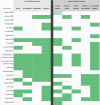Workplace-based Assessment Data in Emergency Medicine: A Scoping Review of the Literature
- PMID: 34099992
- PMCID: PMC8166307
- DOI: 10.1002/aet2.10544
Workplace-based Assessment Data in Emergency Medicine: A Scoping Review of the Literature
Abstract
Objective: In the era of competency-based medical education (CBME), the collection of more and more trainee data is being mandated by accrediting bodies such as the Accreditation Council for Graduate Medical Education and the Royal College of Physicians and Surgeons of Canada. However, few efforts have been made to synthesize the literature around the current issues surrounding workplace-based assessment (WBA) data. This scoping review seeks to synthesize the landscape of literature on the topic of data collection and utilization for trainees' WBAs in emergency medicine (EM).
Methods: The authors conducted a scoping review in the style of Arksey and O'Malley, seeking to synthesize and map literature on collecting, aggregating, and reporting WBA data. The authors extracted, mapped, and synthesized literature that describes, supports, and substantiates effective data collection and utilization in the context of the CBME movement within EM.
Results: Our literature search retrieved 189 potentially relevant references (after removing duplicates) that were screened to 29 abstracts and papers relevant to collecting, aggregating, and reporting WBAs. Our analysis shows that there is an increasing temporal trend toward contributions in these topics, with the majority of the papers (16/29) being published in the past 3 years alone.
Conclusion: There is increasing interest in the areas around data collection and utilization in the age of CBME. The field, however, is only beginning to emerge, leaving more work that can and should be done in this area.
© 2020 Society for Academic Emergency Medicine.
Figures



Similar articles
-
Implementation and Use of Workplace-Based Assessment in Clinical Learning Environments: A Scoping Review.Acad Med. 2021 Nov 1;96(11S):S164-S174. doi: 10.1097/ACM.0000000000004366. Acad Med. 2021. PMID: 34406132
-
Key dimensions of innovations in workplace-based assessment for postgraduate medical education: a scoping review.Br J Anaesth. 2021 Nov;127(5):689-703. doi: 10.1016/j.bja.2021.06.038. Epub 2021 Aug 4. Br J Anaesth. 2021. PMID: 34364651
-
Workplace-based assessments in postgraduate medical education: A hermeneutic review.Med Educ. 2020 Nov;54(11):981-992. doi: 10.1111/medu.14221. Epub 2020 Jul 5. Med Educ. 2020. PMID: 32403200 Review.
-
How workplace-based assessments guide learning in postgraduate education: A scoping review.Med Educ. 2023 May;57(5):394-405. doi: 10.1111/medu.14960. Epub 2022 Nov 21. Med Educ. 2023. PMID: 36286100
-
Specialist training: workplace-based assessments impact on teaching, learning and feedback to support competency-based postgraduate programs.BMC Med Educ. 2023 Dec 11;23(1):941. doi: 10.1186/s12909-023-04922-w. BMC Med Educ. 2023. PMID: 38082397 Free PMC article.
Cited by
-
The scoping review: A flexible, inclusive, and iterative approach to knowledge synthesis.AEM Educ Train. 2021 Jul 1;5(3):e10609. doi: 10.1002/aet2.10609. eCollection 2021 Jul. AEM Educ Train. 2021. PMID: 34222749 Free PMC article. No abstract available.
-
Feedback in Medical Education: An Evidence-based Guide to Best Practices from the Council of Residency Directors in Emergency Medicine.West J Emerg Med. 2023 May 5;24(3):479-494. doi: 10.5811/westjem.56544. West J Emerg Med. 2023. PMID: 37278777 Free PMC article. Review.
-
National Recommendations for Implementation of Competency-Based Medical Education in Family Medicine.Fam Med. 2025 Apr;57(4):253-260. doi: 10.22454/FamMed.2025.866091. Fam Med. 2025. PMID: 40272836 Free PMC article.
-
Do entrustment scales make a difference in the inter-rater reliability of the workplace-based assessment?Med Educ Online. 2022 Dec;27(1):2053401. doi: 10.1080/10872981.2022.2053401. Med Educ Online. 2022. PMID: 35311494 Free PMC article.
-
Examining enablers and barriers to entrustable professional activity acquisition using the theoretical domains framework: A qualitative framework analysis study.AEM Educ Train. 2023 Mar 26;7(2):e10849. doi: 10.1002/aet2.10849. eCollection 2023 Apr. AEM Educ Train. 2023. PMID: 36994315 Free PMC article.
References
-
- McGaghie WC, Miller GE, Sajid AW, Telder TV. Competency Based Curriculum in Medical Education: An Introduction. Public Health Papers No. 68. Geneva: World Health Organization, 1978. - PubMed
-
- Frank JR, editor. The CanMEDS 2005 Physician Competency Framework: Better Standards, Better Physicians, Better Care. Ottawa: Royal College of Physicians and Surgeons of Canada, 2005.
-
- Frank JR. CanMEDS 2015 Physician Competency. Ottawa: Royal College of Physicians and Surgeons of Canada, 2015.
-
- Batalden P, Leach D, Swing S, Dreyfus H, Dreyfus S. General competencies and accreditation in graduate medical education. Health Aff (Millwood) 2002;2:103–11. - PubMed
-
- Kessler CS, Leone KA. The current state of core competency assessment in emergency medicine and a future research agenda: recommendations of the working group on assessment of observable learner performance. Acad Emerg Med 2012;19:1354–9. - PubMed
Publication types
LinkOut - more resources
Full Text Sources
Miscellaneous

